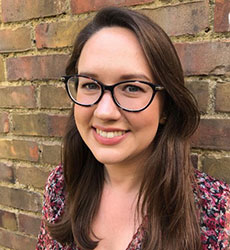Lauren Campbell
Which NHS and Academic Institutions do you work for?
I am a Clinical Scientist at Oxford University Hospitals NHS Foundation Trust and a PhD student and Associate Lecturer at Oxford Brookes University.
What do you like about becoming a Clinical Academic?
What I enjoy most is the variation in my work. I spend the majority of my time working on my primary research study but I also have purely clinical days working in the routine laboratory and authorising results. I have also had the opportunity to work on several smaller research projects in collaboration with other departments and partners in industry. In addition to my work in the laboratory, I teach at both Oxford Brookes and Oxford University. These are all opportunities which have opened up to me since starting my research fellowship and I love having the opportunity to impact patients through both research and clinical work and help to develop the next generation of scientists and medics.
Can you briefly describe how you started to develop as a Clinical Academic?
I went directly from undergrad to the STP and during my training I enjoyed my research project the most. After my training I got the opportunity to be involved in some collaborative research projects, this was a mixture of “right place, right time” and my own push to be involved in any research and development that was happening in the department. I heard about the NIHR offering a Clinical Doctorate Research Fellowship from a colleague and this seemed perfect as I could continue working and developing as a Clinical Scientist alongside obtaining a PhD. The application process involved me turning one of my smaller projects into a large research study – this was long and required a lot of work but it has definitely been worth it.
Give one example of where your work could change practice?
I am currently researching how we can use an algorithm of blood tests in multiple myeloma patients to tell us what is happening in a patient’s bone marrow. I am at the beginning of what will be a long process but I am hoping to improve the patient experience by lowering the number of distressing bone marrow samples needed for effective prognosis and monitoring of their disease. It will also improve patient treatment by detecting the return of the cancer quickly through regular blood tests, so that treatment can be given before irreversible organ damage occurs. Detecting relapse earlier will help to guide therapeutic decisions, reduce both morbidity and mortality, enhance patients’ quality of life and lead to the provision of a more efficient healthcare service.
What advice would you give to a Healthcare Scientist who is an aspiring Clinical Academic?
Show your interest early and ask for opportunities. Talk to your managers and Clinical Leads about your interest in research and development and show them the opportunities that places like the NIHR offer – not everyone is aware of these schemes. My main experience with research was validating and introducing new tests into the laboratory and performing small bits of data collection and analysis. My successes allowed me to lobby for roles in larger research projects and collaborations and eventually apply for the research fellowship.
Lastly, contact other Clinical Academics, all our journeys have been different so see what you connect with and try to find a mentor who can help you navigate the different roles.
